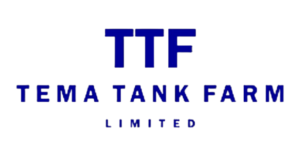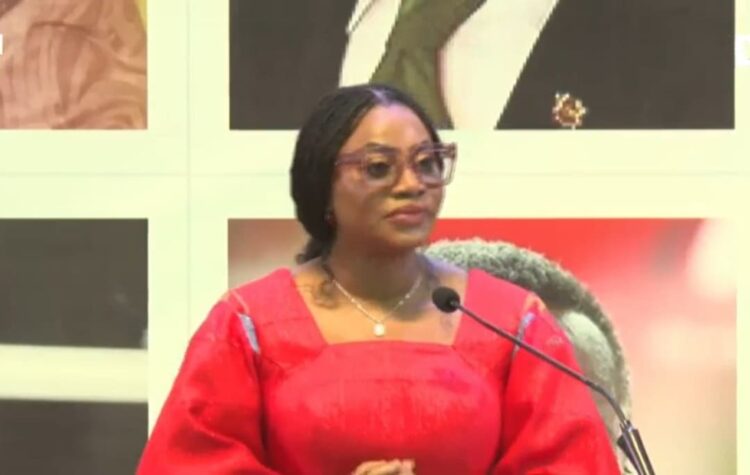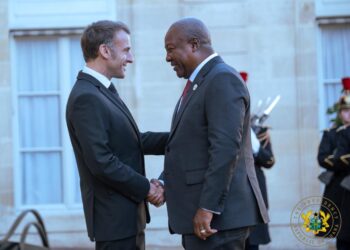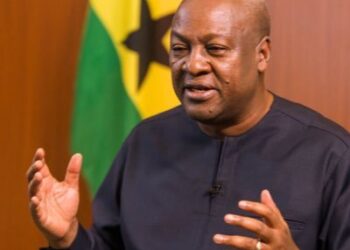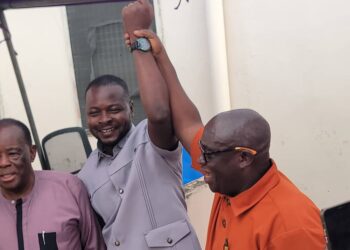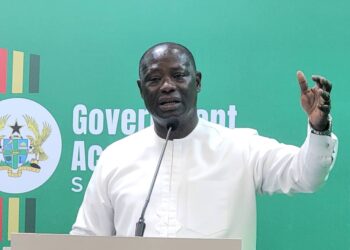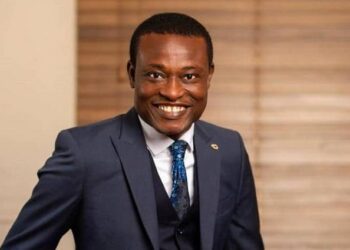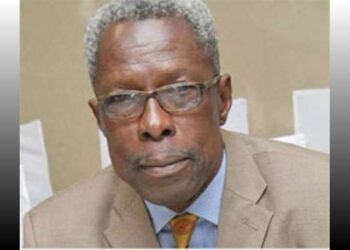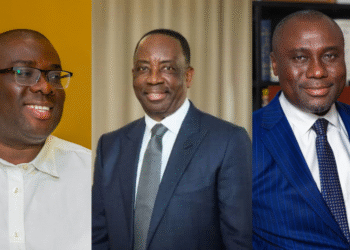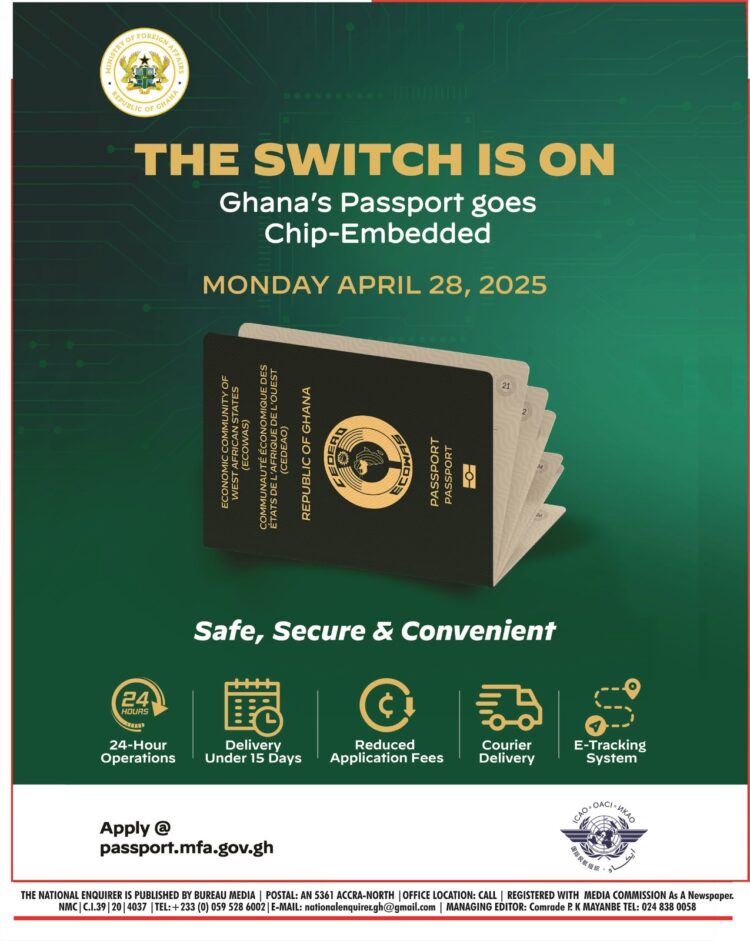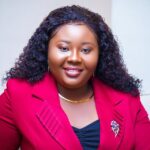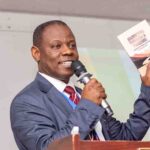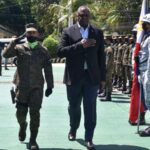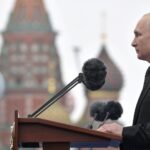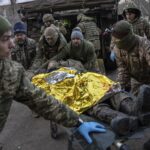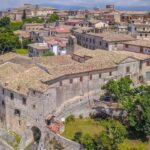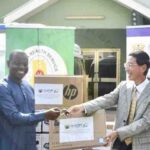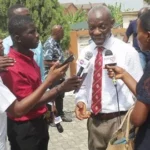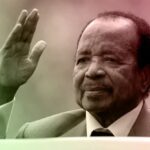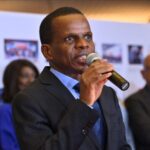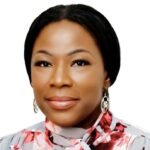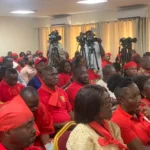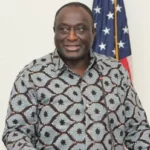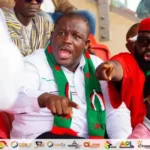Former Electoral Commission Chairperson, Charlotte Osei, says the late President John Evans Atta Mills would be heartbroken by the destruction caused by illegal mining, the growing disregard for truth in the media, particularly online and the worsening culture of blind partisanship.
Delivering the 13th John Evans Atta Mills Memorial Lecture, she said these troubling developments stand in stark contrast to the values of integrity, humility, and national unity the former president embodied.
Read full speech below:
Your Excellency the President, Her Excellency the Vice President, Rt Hon Speaker of Parliament, Hon Julius Debrah, Members of the Board of JEA Mills Memorial Heritage, Members of the Atta Mills and allied families, Hon Ministers of State, Members of Parliament, Excellencies of the Diplomatic Corps, Revered Chiefs and Queen Mothers, Our Lord and Lady Justices, Members of the Fourth Estate, My brothers and sisters.
In a world of noise, integrity is a silent superpower
It is an incredible honour to stand before you today to deliver this year’s JEA Mills Memorial Lecture. I do so with deep emotion and profound humility, paying tribute not only to a president, but to a teacher, a mentor, and a father figure whose life significantly shaped mine
and the lives of many others.
As I prepare to share my reflections of Uncle Fiifi, I am reminded of former President Muhammadu Buhari’s words: “President Atta Mills was a good man; a very good man; one of the very best from our continent.” These words capture the essence of the man we honor
today.
My name is Charlotte Kesson-Smith Osei, and I had the extraordinary privilege of being taught commercial law by Dr. Mills at the University of Ghana, Legon, and later Company Law at the Ghana School of Law, where I won the prize for best graduating student in company law in
- Most significantly, in 2011, he appointed me as Chairperson of the National Commission for Civic Education, making me the first woman to hold that position.
Today, I speak as a mentee reflecting on the profound impact of a teacher who saw potential where others saw youth, who offered opportunity where others saw inexperience, and who built bridges where others saw divisions.
Below is the full statement
PROF JOHN EVANS ATTA MILLS: THE MAN, THE TEACHER, AND THE PRESIDENT
THE REFLECTIONS OF A MENTEE
INTRODUCTION (4 MINUTES)
Your Excellency the President, Her Excellency the Vice President, Rt Hon Speaker of Parliament, Hon Julius Debrah, Members of the Board of JEA Mills Memorial Heritage,
Members of the Atta Mills and allied families, Hon Ministers of State, Members of Parliament, Excellencies of the Diplomatic Corps, Revered Chiefs and Queen Mothers, Our Lord and Lady Justices, Members of the Fourth Estate, My brothers and sisters.
In a world of noise, integrity is a silent superpower It is an incredible honour to stand before you today to deliver this year’s JEA Mills Memorial Lecture. I do so with deep emotion and profound humility, paying tribute not only to a president, but to a teacher, a mentor, and a father figure whose life significantly shaped mine and the lives of many others.
As I prepare to share my reflections of Uncle Fiifi, I am reminded of former President Muhammadu Buhari’s words: “President Atta Mills was a good man; a very good man; one of the very best from our continent.” These words capture the essence of the man we honor today.
My name is Charlotte Kesson-Smith Osei, and I had the extraordinary privilege of being taught commercial law by Dr. Mills at the University of Ghana, Legon, and later Company Law at the Ghana School of Law, where I won the prize for best graduating student in company law in 1994. Most significantly, in 2011, he appointed me as Chairperson of the National Commission for Civic Education, making me the first woman to hold that position.
Today, I speak as a mentee reflecting on the profound impact of a teacher who saw potential where others saw youth, who offered opportunity where others saw inexperience, and who built bridges where others saw divisions.
The theme for this memorial lecture is “Atta Mills, A Case Study for the Fourth Republic.” I approach this theme through three lenses: “Prof John Evans Atta Mills: The Man; The Teacher; and The President; The Reflections of A Mentee.”
PART I: THE MAN – CHARACTER FORGED IN HUMILITY AND INTEGRITY (12 MINUTES)
The Foundation of Character (2 minutes)
Professor John Evans Fiifi Atta Mills was born on July 21, 1944, in Tarkwa, Western Region, and tragically passed away on July 24, 2012, just three days after his 68th birthday. In those 68 years, he lived a life that exemplified the highest ideals of scholarship, public service, and human dignity.
Wealth impresses the crowd. Character builds the republic. Born to John Atta Mills Sr., an educationist at Komenda Teacher Training College, and Mercy Dawson Amoah, young Fiifi was the second child and first son among seven siblings. From his father, he inherited a love of learning and teaching; from his mother, he gained the gentle strength that would characterize his leadership style.
His educational journey took him from Huni Valley Methodist Primary School to Komenda Methodist Middle School, then to Achimota School, where he completed his Ordinary and Advanced Level Certificates in 1961 and 1963. At the University of Ghana, he completed his bachelor of law degree and professional law certificate in 1967.
Academic Excellence and Global Recognition (2 minutes)
Mills’ pursuit of higher education took him to the London School of Economics for his LLM in 1968, and then to the School of Oriental and African Studies at the University of London, where he earned his PhD in Law in 1971 at the remarkably young age of 27.
His selection as a Fulbright Scholar to Stanford Law School in 1971 was not merely an academic achievement; it was a testament to his character and potential. The Fulbright Program chose Mills not just for his intellectual capabilities, but for his potential to be a bridge-builder and a leader. At Stanford, colleagues remember him as someone who listened more than he spoke, who asked thoughtful questions, and who approached every challenge with both intellectual rigor and human compassion. He was, in the words of one Stanford professor, “a scholar-gentleman in the truest sense of the term.”
Humility as a Leadership Virtue (2 minutes)
Perhaps no quality defined Mills the man more than his humility. In a continent where political leaders are often known for high-handed approaches to power, Mills remained remarkably grounded throughout his life and presidency. His humility was not weakness; it was strength under control.
This humility was evident in his famous declaration: “I have always said that I will be President for all Ghanaians whether they voted for me or not and without consideration for which part of the country they come from.” These were not mere campaign promises; they were the words of a man who truly understood that leadership is service, not privilege.
His approach to leadership emboldened me on two occasions to tell him that I thought a decision he took was wrong, and in another case, unfair. He took the criticism calmly. We argued as lawyers and eventually, in one matter, months later, I got a message: “You were right and I was wrong.” That was such an emotional moment for me and a great lesson in leadership.
Power that fears criticism is already bankrupt Integrity in an Age of Compromise (2 minutes)
In an era when political integrity often seemed like an oxymoron, Mills stood as a beacon of moral leadership. His integrity was not situational; it was absolute. Asiwaju Bola Ahmed Tinubu, current president of Nigeria, best captured this: “President Atta Mills was a man with a profound, comprehensive intellect. Unlike many individuals whose public carriage as a politician diverges negatively from their private persona, the private and public morals and practices of this man were undifferentiated. There was no seam dividing the public official from the private man. He was guided by a moral compass that did not waver according to the circumstance.”
His approach to corruption was uncompromising: “I would not spare any government official be it past or present, who would be found guilty of embezzling state funds.” This was not political rhetoric; it was a moral conviction that guided his administration.
Ewurama’s story …. The law is the law
The Peacemaker’s Heart (2 minutes)
Mills was fundamentally a man of peace. This was not passive pacifism, but active peacemaking. He understood that peace was not merely the absence of conflict, but the presence of justice, understanding, and mutual respect.
His philosophy of peace was captured in his words: “we are going to ensure that there is peace before, during and after the election, because when there is no peace, it’s not the elites who will suffer, it’s the ordinary people who have elected us into office.”
I recall as a student, Prof telling us that “as far as possible, we should make sure we are not the reason for anyone losing their job.” Many of my classmates remember these words of caution. Later in my public life, in trying to emulate my mentor, I applied this advice, sometimes to my own significant harm. But Prof was right – my conscience is clean and I am at peace. So peaceful Prof Mills still wins the day.
The Complete Man: Sportsman, Family Man, and Believer (2 minutes)
Mills’ character was also shaped by his love of sports, particularly hockey. He played for the Ghana national hockey team, learning valuable lessons about teamwork, discipline, and fair play. The values from the hockey field – working together toward common goals, respecting teammates and opponents, understanding that individual success means nothing without team success – would later inform his political leadership.
Most of my law school colleagues would recall male students gathered around Prof after lectures, not discussing commercial law or tax policy, but discussing football. That was the measure of the man.
Behind the public figure was a devoted family man, married to Ernestina Naadu Mills, with son Sam Kofi Atta Mills and many siblings and extended family. His approach to family life reflected the same values that guided his public service: love, respect, commitment, and sacrifice.
Mills’ character was deeply rooted in his Christian faith as a Methodist. His belief in divine providence gave him strength to persevere through political defeats and personal challenges. He genuinely believed that his talents and opportunities were gifts to be used in service of others, not privileges to be enjoyed for personal benefit.
You can’t fake legacy, time always tells
The character of John Atta Mills the man created the foundation for everything he would accomplish as a teacher and a president. His humility made him approachable, his integrity earned him trust across divides, his commitment to peace created stability for progress, and his love of learning inspired others to pursue excellence.
PART II: THE TEACHER – NURTURING MINDS AND BUILDING FUTURES (10 MINUTES)
The Call to Academia (1 minute)
When Professor Mills returned to Ghana after Stanford Law School, he faced a choice that would define not only his own future but the futures of countless young Ghanaians. He could have pursued lucrative opportunities in private practice or international organizations, but instead, he chose the path of the teacher.
Mills’ first formal teaching assignment was as a lecturer at the Faculty of Law at the University of Ghana, Legon. He would spend the next 25 years in this role, rising to Associate Professor by 1992. But the real measure of Mills the teacher lies not in his academic achievements, though they were considerable, but in his impact on the minds and hearts of his students.
Reputation built in silence lasts longer than applause
Teaching Philosophy and Classroom Excellence (3 minutes)
For Professor Mills, the classroom was more than a venue for transmitting information; it was a sacred space where minds were opened, characters were formed, and futures were shaped. Students who attended his law classes remember a professor who demanded excellence but provided the support necessary to achieve it. He had high expectations, so marks were usually low! But he also had high investment in his students’ success.
Mills understood that teaching law was not just about imparting legal knowledge; it was about developing legal minds. He taught his students not just what to think, but how to think. He emphasized critical analysis, logical reasoning, and ethical reflection. He wanted his students to understand not just the letter of the law, but its spirit and purpose.
Mills’ approach to teaching was deeply influenced by his understanding of law as a tool for social justice and national development. He did not see legal education as merely professional training, but as preparation for service to society. Hence his earlier admonition about not being the cause of someone losing their job.
He also emphasized the importance of integrity in legal practice. He understood that lawyers would often face situations where they could choose between personal gain and professional ethics. Through his teaching and personal example, he sought to instill in his students the moral foundation necessary to make the right choices.
Mentorship Beyond the Classroom (3 minutes)
While Mills was an excellent classroom teacher, his greatest impact as an educator came through his mentorship relationships with individual students. He had an extraordinary ability to identify potential in young people and to nurture that potential through guidance, encouragement, and opportunity.
As one of his students in both commercial law and company law, I experienced firsthand the transformative power of his mentorship. Professor Mills saw something in me that I had not yet seen in myself. He challenged me to think more deeply, to write more clearly, and to aspire more boldly. But more than that, he believed in me at a time when I was still learning to believe in myself.
His mentorship style was characterized by high expectations combined with unwavering support. He would push his mentees to excel, but he would also provide the resources and guidance necessary for that excellence.
Mills was particularly committed to mentoring young women in law, recognizing the barriers they faced and the potential they represented. Lady Julia Osei Tutu and myself were two young women who probably would not have been able to obtain our Master of Laws degrees without the support of Prof Mills. Through his support, one of my classmates ended up at Prof’s alma mater, the London School of Economics for his LLM, and Prof helped him get his first job at the Ghana Stock Exchange.
He really made himself accessible to his students. When I needed help to ship over 50 boxes of books I got for the law library from Queen’s University, Canada, one message to Prof, then Vice President, and he promptly put all the support together to enable the shipment happen before my landlord kicked me and the books out onto the streets of Kingston, Ontario.
Scholar-Teacher and Institution Building (2 minutes)
Mills’ effectiveness as a teacher was enhanced by his active engagement in scholarship and research. He was not merely a transmitter of existing knowledge, but a creator of new knowledge. His doctoral thesis on taxation and economic development reflected his deep interest in the intersection of law and development policy.
His scholarly work informed his teaching in important ways. He brought to the classroom not just textbook knowledge, but insights gained from his own research. He helped his students understand that law was not a static body of rules, but a dynamic field that evolved in response to changing social and economic conditions.
Mills was deeply committed to building the institutional capacity of the Faculty of Law at the University of Ghana. He wanted Ghanaian law students to be able to compete with their counterparts anywhere in the world, but he also wanted them to understand and address the specific legal and developmental challenges facing Ghana and Africa.
His appointments as visiting professor at Temple University in Philadelphia (1978-1979 and 1986-1987) and visiting lecturer at Leiden University in the Netherlands (1985-1986) enriched his teaching. He brought back new perspectives on legal education, new approaches to legal research, and new insights into comparative law. Many of his students, myself included, gained admission to these universities on the strength of his reputation and references. And he was a reference on many CVs because we all recognized that although firm, Prof was very kind. (the shoe story)
Creating Future Leaders and Lasting Impact (1 minute)
Perhaps Mills’ greatest achievement as a teacher was his role in creating the next generation of legal and political leaders in Ghana. Many of his former students have gone on to distinguished careers in law, business, government, and civil society. They carried with them not just the legal knowledge he had imparted, but also the values and principles he had modeled.
My own appointment as Chairperson of the National Commission for Civic Education in 2011 was just one example of how Mills continued to mentor and support his former students throughout their careers. He did not see graduation as the end of his relationship with his students, but as the beginning of a new phase of mentorship and support.
Even as President, Mills maintained his commitment to education and to young people. His administration’s focus on education reform, his emphasis on bringing young people into government, and his continued engagement with students and young professionals all reflected his understanding that leadership was ultimately about teaching and mentoring the next generation.
Real leadership begins when you lose the microphone
Mills understood that the teacher’s role was not just to impart knowledge, but to inspire learning. He wanted to create not just knowledgeable citizens, but thinking citizens who could analyze problems, evaluate solutions, and contribute to national development.
PART III: THE PRESIDENT – LEADERSHIP THROUGH SERVICE AND YOUTH EMPOWERMENT (15
MINUTES)
The Long Road to the Presidency (2 minutes)
Professor Mills’ journey to the presidency was not a straight path, but rather a testament to perseverance, principle, and the democratic process. His political career began in earnest when he was selected as Vice President under President Jerry Rawlings in 1997, serving until 2001. This experience provided him with invaluable insights into the workings of government and the challenges of leadership in a developing democracy.
Mills’ first bid for the presidency in 2000 ended in defeat to John Agyekum Kufuor. Rather than retreating from politics, Mills used this setback as a learning opportunity. His second attempt in 2004 also ended in defeat, but again, Mills demonstrated the resilience and determination that would characterize his leadership style.
It was not until 2008, on his third attempt, that Mills finally achieved his goal of becoming President of Ghana. His victory was narrow – less than one percentage point in a runoff election. More importantly, it represented a peaceful transfer of power between political parties, demonstrating the maturity of Ghana’s democracy and Mills’ commitment to democratic principles.
The long road to the presidency was not just a personal journey for Mills; it was preparation for the kind of leader he would become. The defeats taught him humility and empathy. The years of opposition gave him deep understanding of ordinary Ghanaians’ concerns. The democratic process reinforced his commitment to consensus-building and inclusive governance.
The “Better Ghana Agenda” (2 minutes)
Mills came to the presidency with a clear vision encapsulated in what he called the “Better Ghana Agenda.” This was not merely a campaign slogan, but a comprehensive framework for national development that reflected his understanding of Ghana’s challenges and opportunities.
The Better Ghana Agenda was built on several key pillars: economic transformation, social development, good governance, and infrastructure development. But underlying all of these was Mills’ fundamental belief that Ghana’s greatest resource was its people, particularly its young people. He understood that building a better Ghana required not just better policies, but better leaders, and that meant investing in the leadership development of the next generation.
Mills’ approach to the Better Ghana Agenda was characteristically thoughtful and inclusive. He did not claim to have all the answers, but rather sought to create a framework within which Ghanaians could work together to find solutions to their common challenges.
Revolutionary Youth and Women Empowerment (4 minutes)
Perhaps no aspect of Mills’ presidency was more revolutionary than his deliberate decision to make his administration what was proudly called “a government of the youth and women.” This was not tokenism or political calculation, but a fundamental reimagining of what government could and should look like.
Mills understood that Ghana’s future belonged to its young people, and he believed that they should have a voice in shaping that future. He also recognized that women represented an underutilized resource in Ghana’s development, and he was determined to change that.
Among the young people Mills brought into his administration were individuals like Hanna
Tetteh, who served as Minister for Trade and Industry, and Haruna Iddrisu, who served as
Minister for Communications. These were not ceremonial positions, but key portfolios that required both technical expertise and political skill. We can mention Dr. Omane Boamah, our current Minister for Defence, Hon. Felix Ofosu Kwakye, MP & Minister for Government Communications, Foreign Minister & MP Hon Samuel Okudzeto-Ablakwa, and many others too numerous to mention here. Oh it is important to mention one of his more prominent students- Prof Kwamena Ahwoi.
Bringing all these young people (except Prof Ahwoi) into public service and politics was not accidental. He deliberately and very intentionally tasked people to find student leaders at universities and other smart young people and bring them into governance.
My own appointment as Chairperson of the National Commission for Civic Education in 2011 was part of this broader pattern. Mills did not just appoint young people; he appointed qualified young people and then gave them the support and authority necessary to succeed. He understood that youth empowerment was not about lowering standards, but about creating opportunities for excellence. Although he selected me to chair the NCCE, it was not without several interviews presented as conversations to establish my competence, my vision for the institution and that I was not a card bearing member of any party, before he finalized the appointment.
The impact of Mills’ youth appointments extended far beyond the individuals directly involved. These appointments sent a powerful message to young Ghanaians that their government valued their contributions and believed in their potential. They created role models and inspiration for countless other young people who saw that public service was not just for the old and established, but for anyone with the qualifications, commitment, and vision to serve.
Governance Philosophy and Major Achievements (4 minutes)
*Inclusive Leadership Philosophy* Mills’ approach to youth empowerment was rooted in a broader philosophy of inclusive leadership. He genuinely believed in his often-quoted words: “I have always said that I will be President for all Ghanaians whether they voted for me or not and without consideration for which part of the country they come from.”
This was not just political rhetoric; it was a governing philosophy that shaped every aspect of his administration. Mills understood that Ghana’s diversity – ethnic, regional, religious, gender and generational – was a source of strength, not division, but only if that diversity was properly harnessed and included in the governance process.
Economic Stewardship and Oil Discovery
Mills inherited an economy facing significant challenges, including the global financial crisis of 2008-2009. His response demonstrated both his intellectual rigor and his commitment to evidence-based policy-making. Rather than relying on ideological prescriptions, Mills and his team carefully analyzed Ghana’s economic situation and developed targeted interventions.
One of the most significant developments during Mills’ presidency was the beginning of largescale oil production in Ghana in December 2010. This presented both enormous opportunities and significant risks. Mills approached this challenge with characteristic thoughtfulness, working to ensure that oil revenues would be used for long-term development rather than short-term consumption.
Education and Human Development
Mills’ commitment to education, rooted in his own experience as a teacher, was evident throughout his presidency. He understood that Ghana’s long-term development depended on the quality of its human capital, and he was determined to invest in education at all levels.
His administration’s education policies reflected his belief that education should be both accessible and good. He worked to expand access to education, particularly for girls and children from disadvantaged backgrounds, while insisting on maintaining and improving quality.
Democratic Consolidation
Mills’ presidency played a crucial role in consolidating Ghana’s democracy. His commitment to democratic principles was evident in his respect for the rule of law and his tolerance of dissent and criticism. Kofi Annan, former UN Secretary General, said of Prof: “Ghanaians must extol the late president… because his reign transformed the country as a model of investment possibilities… cemented political stability and while presiding over Ghana’s first production of oil, he accelerated economic growth for the benefit of this fine West African country.”
International Relations and African Leadership (1 minute)
Mills’ presidency also marked Ghana’s emergence as a respected voice in international affairs. His approach to foreign policy was rooted in his understanding of Ghana’s role as a beacon of democracy and stability in Africa. He sought to use Ghana’s influence to promote peace, democracy, and development throughout the continent.
The president’s international engagements reflected his intellectual approach to leadership. He was comfortable discussing complex policy issues with world leaders, bringing to these discussions a deep understanding of both African realities and global trends. His meetings with leaders like President Barack Obama demonstrated Ghana’s growing international stature under his leadership. How did I know all these? I used to write his speeches especially for national and international engagements under the supervision of Hon. Kofi Totobi-Quakyi.
The Ultimate Sacrifice (2 minutes)
Mills’ presidency ended tragically with his death in office on July 24, 2012. He literally gave his life in service to Ghana, working until his final day to build the better Ghana he had promised. His death was not just the loss of a president, but the loss of a teacher, mentor, and father figure to millions of Ghanaians.
The circumstances of Mills’ death – dying in office while serving his people – provided a final testament to his character and commitment. He could have stepped down when his health began to fail, but he chose to continue serving until the end. This was not stubbornness or ego, but a deep sense of responsibility to the people who had entrusted him with leadership.
Mills’ peaceful succession by his Vice President, John Dramani Mahama, demonstrated the strength of Ghana’s democratic institutions and the wisdom of Mills’ approach to governance. The smooth transition was a tribute to the democratic culture that Mills had helped to nurture and strengthen.
Mills’ presidency, though tragically cut short, left an indelible mark on Ghana and its people. His legacy as president can be measured in many ways: the peaceful elections he oversaw, the young leaders he empowered, the institutions he strengthened, and the vision he articulated for Ghana’s future. But perhaps his greatest legacy as president was his demonstration that leadership could be both effective and ethical, both strong and humble, both visionary and practical.
Prof was not a saint. Like all humans, he had his shortcomings. But we are the better for his having been here. He left his family, his students and his country, better than he met them. And for that, we are grateful.
PART IV: REFLECTIONS OF A MENTEE – PERSONAL LESSONS AND LASTING IMPACT (6
MINUTES)
The Personal Journey (1 minute)
As I reflect on the life and legacy of Professor John Evans Atta Mills, I am acutely aware that I speak not just as an observer of history, but as a participant in it. My relationship with Professor Mills spanned multiple phases of both our lives – from my days as his student, to speech writer, to my appointment as Chairperson of the National Commission for Civic Education, to the ongoing influence of his teachings on my life and work.
The journey from student to mentee to public servant was not one I had planned or even imagined when I first entered his classroom. But Professor Mills saw something in me that I had not yet seen in myself. This was his gift – the ability to recognize potential and to nurture it with patience, wisdom, and unwavering support.
Key Mentorship Lessons (2 minutes)
What made Professor Mills such an effective mentor was his ability to balance guidance with independence. He provided direction when I needed it, but he also encouraged me to think for myself and to develop my own perspectives and approaches.
Professor Mills’ mentorship was characterized by several key qualities:
Accessibility: Despite his busy schedule and growing responsibilities, Professor Mills always made time for his mentees. Even as Vice president, I remember being at a funeral where Prof saw me and sent someone to drag me over to enquire why I had not come to see him at the castle. Many of my colleagues received similar messages.
Authenticity: Professor Mills was genuine in his interactions with his mentees. He did not put on airs or try to impress us with his knowledge or position. He was simply himself – wise, caring, and committed to our success.
Patience and Challenge: Professor Mills understood that growth and development take time. He was patient with our mistakes and supportive of our efforts to learn and improve. While supportive, he was not permissive. He challenged his mentees to think more deeply, to work harder, and to aspire higher.
Opportunity: Perhaps most importantly, Professor Mills created opportunities for his mentees. He opened doors that might otherwise have remained closed, and he provided platforms for us to demonstrate our capabilities.
In 2011, when Professor Mills offered me the position of Chairperson of the National Commission for Civic Education, I was both honored and terrified. There was no excuse I did not come up with in my attempt to decline the role. Prof’s only response was: “if we all don’t do it, what will become of Ghana?”
Leadership Lessons Learned (2 minutes)
Serving under President Mills provided me with invaluable lessons in leadership that no textbook or classroom could have taught. I observed firsthand how he approached complex problems, how he built consensus among diverse stakeholders, and how he maintained his principles while navigating political realities.
** The Person and the Positions: Prof held many positions of power which he could have abused for personal gain or could have changed how he related with and engaged people. This didn’t happen. As a lecturer, he was very kind but very firm and principled. Aa a tax commissioner, he was same- focused and firm but gentle. As president, he was the same. Open and engaging, he wore the trappings of the office very uneasily. The positions never changed Prof. They were essentially, vehicles of service.
The Importance of Listening: He was an exceptional listener who genuinely sought to understand different perspectives before making decisions. He created space for others to share their views, and he considered those views seriously even when they differed from his own initial thinking.
Preparation and Deliberation: President Mills rarely made impulsive decisions or reacted emotionally to challenges. Instead, he gathered information, consulted with advisors, considered options carefully, and then acted decisively.
Integrity in Leadership: President Mills never asked his team to do anything that he would not do himself, and he never compromised his principles for political expediency. He understood that trust was the foundation of effective leadership.
Humility in Power: Despite holding the highest office in the land, he remained approachable and down-to-earth. He treated everyone with respect, regardless of their position or status. He was quick to give credit to others and slow to claim credit for himself.
Continuing Influence and Final Lessons (1 minute)
Even after President Mills’ death in 2012, his influence on my life and work has continued. The lessons he taught me, the values he instilled in me, and the vision he shared with me continue to guide my decisions and actions.
Before I end this lecture, I would like to recount my last meeting with Prof. This was a couple of months before he passed on. With the help of Col Attachie and Col Lawson, I had managed to sneak past Mr. Martey Newman and Mr. Bebaako-Mensah to go see Prof and fight for some additional resources for the NCCE election year activities.
Prof was not happy that day due to vicious media attacks, some from people who knew him better. I told him he shouldn’t be reading or listening to the media, that he needed to detach completely. I then added that “they would only appreciate you when you’re gone.” I meant after his tenure, having no way of knowing that would be my last physical meeting with Prof.
After Prof’s death, I was part of the publications team working towards his funeral, compiling tributes for the Tribute book. What struck me was the most beautiful tributes submitted by his more virulent attackers we had discussed shortly before he died.
I learned a huge lesson: To serve well in public service, one must do right by God, conscience and law. One must be ready to suffer the attacks from the lenses of current affairs, but be certain in the knowledge that history will always vindicate the just. I held these lessons closely through my time in public service.
CONCLUSION: THE ETERNAL LEGACY (3 MINUTES)
The Integrated Life (1 minute)
As I conclude these reflections on Professor John Evans Atta Mills – the man, the teacher, and the president – I am struck by the timeless relevance of his example. In a world that often seems to reward cynicism over idealism, self-interest over service, and division over unity, Professor Mills’ life stands as a beacon of what is possible when leadership is rooted in character, guided by principle, and dedicated to the common good.
One of the most remarkable aspects of Professor Mills’ life was its integration. He was not three different people – the man, the teacher, and the president – but one person whose character, values, and principles remained consistent across all roles and contexts. The humility that characterized him as a man informed his approach as a teacher and shaped his style as a president.
This integration is perhaps Professor Mills’ most important lesson for all of us, but especially for young people who are still forming their identities and choosing their paths. He showed us that it is possible to be authentic and consistent, to maintain one’s principles while adapting to different roles and responsibilities.
Call to Action (1 minute)
As we honor Professor Mills’ memory, we must also commit ourselves to continuing his work. This is not just the responsibility of those who knew him personally, but of all Ghanaians and all Africans who share his vision of a better future.
For young people: pursue excellence in your education and your work, seek out mentors and be willing to learn, take advantage of opportunities to serve others, and commit yourselves to building the kind of society that Professor Mills envisioned.
For leaders at all levels: invest in young people, create opportunities for their development and advancement, lead with integrity and humility, and remember that leadership is ultimately about service, not privilege.
For all of us: embody the values that Professor Mills exemplified – honesty in our dealings, compassion in our relationships, excellence in our work, and service in our communities. (compassion, the lift stories)
The Living Legacy (1 minute)
Professor Mills once said, “My doors are always open, we’ll make sure to provide the resources and make the necessary contacts. As a Government, we’ll give you the fullest support.” These words capture the essence of his approach to leadership and mentorship throughout his life.
Even in death, Professor Mills’ doors remain open. His example continues to teach us, his vision continues to inspire us, and his legacy continues to challenge us to be better than we are. He remains our eternal teacher, showing us through his life what is possible when character meets opportunity, when principle guides power, and when service defines success.
Professor Mills understood that the ultimate measure of any generation is not what it accomplishes for itself, but what it makes possible for the next generation. He dedicated his life to ensuring that young people’s dreams were not destroyed, but nurtured, supported, and given the opportunity to flourish.
As he said: “Standing here every 6th March as President since 2009, and watching our youth partake actively in this celebration, there is no doubt in my mind that they are filled with dreams; big dreams of taking over from us, and becoming responsible adults… We must not destroy their dreams.”
Today, as we face new challenges and new opportunities, we must ask ourselves: Are we nurturing the dreams of our young people? Are we creating opportunities for them to serve and lead? Are we providing them with the education, mentorship, and support they need to build a better future?
Professor Mills would want us to answer these questions not just with words, but with actions. He would want us to open our doors as he opened his, to provide resources and support as he provided them, and to believe in young people as he believed in us.
I end by expressing my immense gratitude to the JEA Mills Memorial Heritage LBG, the organizers of this annual lecture in honour of a truly great soul for the past thirteen years, and for giving me the honour of a lifetime by selecting me as the speaker for today.
May we be worthy of Prof’s trust, faithful to his example, and tireless in continuing the work he begun. May the memory of Prof John Evans Atta Mills forever be a blessing and a call to service.
Thank you all for making time to join us today physically and virtually. Thank you.
